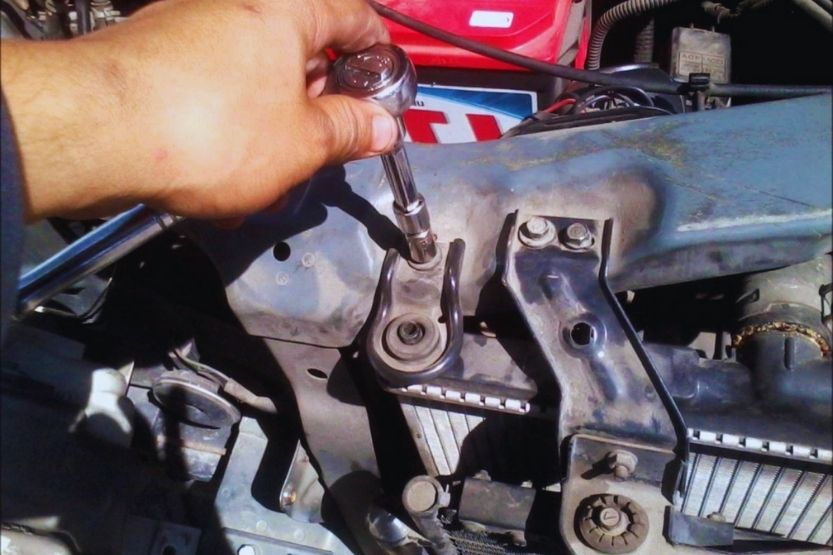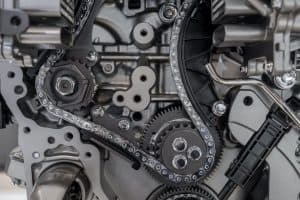Overheating in the Honda Civic is one issue that many Honda owners face. This problem is most common in models from 1990 to 2005. What are the possible causes of Honda Civic overheating?
The possible causes why a Honda Civic is overheating are the following:
- Cooling system leak
- Damaged radiator
- Broken water pump
- Bad thermostat
- Issues with the head gasket
- Failing temperature gauge
Read on to learn more about the causes of Honda Civic overheating and how to fix this issue.
Causes of Honda Civic Overheating and How to Fix Them

Different factors can cause engines to overheat. Overheating is generally due to a problem with the cooling system, which prevents heat from escaping the engine compartment. Below are the causes of Honda Civic overheating and their respective solutions:
1. Cooling System Leak
If the car consumes an excessive amount of coolant, something is wrong. You can fix the Honda Civic’s overheating problem by identifying the cause.
Inspect the Oil with a Dipstick
The coolant can potentially leak into the engine, which is quite dangerous. Examine the oil with a dipstick to see if it appears to be a milky liquid.
If it seems to be ordinary oil, there is no need to be concerned. On the other hand, a milky color means that oil and coolant have mixed in the engine, and you will need to replace them to repair the problem.
Corroded Freeze Plug
You will also have a coolant leak if a freeze plug becomes so corroded that it perforates. You can fix this by replacing the rusted-out freeze plug with a new one.
This job can be easy or extremely complex depending on where the afflicted freeze plug is located. These parts are commonly found on the engine’s sides, three or four per side.
2. Damaged Car Radiator
Composed of Flattened Metal Tubes
The radiator core is often composed of flattened metal tubes with zigzag aluminum strips in between. The heat in the tubes is transferred to the air stream and then transported away by these fins. A tank, usually composed of plastic, sits on each end of the radiator core and covers the ends of the radiator.
Prevents Water from Flowing
Because a blocked radiator prevents the water from flowing correctly, replacing the radiator can fix the Honda Civic’s overheating problem. Clean the radiator and add antifreeze to it. Warm up the car with the cap open to see if the water flows properly.
The presence of bubbles in the water indicates a problem with the head gasket. Otherwise, use a new radiator cap to seal the radiator.
3. Broken Water Pump
Keeps the Coolant Moving
A water pump is a device that keeps the coolant moving as long as the engine is running. It is usually placed on the front of the engine and rotates when running.
Water Pump’s Speed Increases as the Engine’s RPM Increases
The speed of the water pump increases as the engine’s RPM rises. The water pump turns slowly when the vehicle is idling. The water pump cannot transfer coolant through the radiator and back to the engine when the automobile is overheating while idling.
Place the car on neutral or park and crank the engine to roughly 1000 RPM below the redline for a few seconds to test this. As the water pump spools up, the temperature should drop.
It isn’t easy to replace a water pump. Depending on where it is, replacing a water pump can be pretty simple or a complete disaster.
4. Bad Thermostat
Measures the Temperature of the Coolant
The thermostat is essentially a valve that measures the temperature of the coolant. It opens to allow the coolant to flow through the radiator if it is hot enough.
The flow to the radiator is restricted if the coolant is not hot enough, and the fluid is shunted to a bypass system that permits the coolant to return to the engine.
Bypass Mechanism
This bypass mechanism keeps the coolant circulating throughout the engine, balancing the temperature and preventing hot spots.
Because the radiator’s flow is impeded, the engine will reach operating temperature faster, allowing the heater to start pumping hot air to the interior sooner on a cold day.
Controls When the Coolant Should Enter and Exit the Engine
The thermostat in your Honda Civic regulates when coolant enters and exits the engine. The brown sludge will likely smear the thermostat if you put a sealant in the coolant system.
The antifreeze boils and pushes through the radiator cap due to a stuck thermostat, causing the engine to overheat. Because an overheated thermostat is damaged, you must replace it. Regardless of the cause, an overheated engine indicates that the thermostat is already malfunctioning.
5. Issues with Head Gasket
Consists of Pliable Sheet Metal with Ridges
A common head gasket consists of pliable sheet metal with ridges around all the leak sites. You can find the head gasket between the head and the block when installed.
Many bolts, known as head bolts, are screwed in and tightened, causing the head gasket to crush and establish a tight seal between the block and the head.
You can also use antifreeze in the combustion chamber. Sweet-smelling white smoke will emerge from the exhaust system in that situation. Also, when the smoke comes out of the exhaust pipe, it will be highly humid. All of these signs point to one thing: the head gasket.
Compression Test
A compression test on the cylinders can also reveal a head gasket problem. Suppose one cylinder’s pressure is lower than the others.
In that case, it’s probably a faulty head gasket causing the Honda Civic to overheat by either pumping compression into the cooling system or burning the engine’s water.
6. Failing Temperature Gauge
While your Honda Civic’s temperature gauge is usually reliable, it is still an electrical instrument that can fail. Before attempting the repair, a mechanic would personally check the engine’s temperature with a heat gun to ensure that the gauge was reading accurately.
You can discard the temperature gauge notion if the car is overheating while idling, and you can identify the smell associated with a high temperature.
Again, what causes the Honda Civic overheating problem? A clogged radiator causes the Honda Civic to overheat. Either replace the radiator or clean it, then fill it with antifreeze. Keep the cap open to check and observe whether the water is flowing freely.
What to Do If Your Vehicle Starts Overheating?

If the dashboard warning lights come on while you’re driving, you notice a peculiar smell originating from the engine, see smoke, or feel your car isn’t driving as it should, you should follow these measures for your Honda Civic:
1. Pull Over to a Clear and Safe Area
Once you notice a problem with your Honda Civic, follow the steps below:
- Pull over to a clear and safe area and turn it off.
- Do not lift the hood unless the car has completely stopped and turned off.
- Depending on how long the car has been operating, the coolant in the vehicle may have heated up to extremely high temperatures, causing the cooling system to pressurize. Wait for at least a half-hour before attempting to pop the hood to avoid harm.
- After your car has completely cooled down, you can safely open the hood.
2. Keep Moving If Only Necessary
Keeping the car running slowly may still provide continual airflow around the motor if you cannot stop in a safe and clear area. This helps to cool your car naturally.
Leaving your Honda Civic unattended with the engine running can aggravate the problem by rapidly producing additional and unwanted heat.
3. Turn on the Heat
Yes, it is correct. Turning off the air conditioning of your Honda Civic and boosting the heat to high while the car moves may help to take additional heat away from the engine.
4. Open All the Windows
Opening all the windows will release as much heat from the system as possible. So, roll down and open as many windows as feasible.
5. Call for Assistance
Stay safe by calling roadside assistance, where a technician can assess what’s causing your car to overheat and perform necessary repairs.
What Happens When An Engine Overheats?

When the heat generated by a car’s motor exceeds the normal operating temperature, the devices designed to cool this heat distribution may fail. In turn, this can cause permanent damage to the following:
- Engine,
- Gaskets,
- Hoses, and
- Seals.
How Does a Cooling System Work?
Now that you know why your Honda Civic is overheating, let us review how an engine cooling system works.
Maintains a Steady Operating Temperature for the Engine
The entire cooling system maintains a steady operating temperature for the engine by flowing coolant, or antifreeze, from the engine to the radiator, thus directing heat away from the engine. A cooling system circulates liquid coolant via passages in the engine block and heads to keep the engine cool.
Coolant Absorbs Heat from the Engine
The coolant absorbs heat from the engine as it passes through these channels. The heated fluid then travels to the radiator in front of the car via a rubber tube. The air stream from the automobile’s engine compartment cools the hot liquid.
Tips to Prevent Your Car from Overheating
Here are a few simple driving tips that will help you avoid permanent engine damage down the road:
- Check your vehicle’s coolant level regularly.
- Have an extra bottle of a gallon of water and new antifreeze in your trunk.
- Keep an eye on your car’s thermostat.
- Avoid overusing your car’s air conditioner.
- Turn on the heat to help cool the engine at the first sign of overheating.
- Check the vehicle’s owner’s manual to keep up with coolant maintenance flushes.
Conclusion – Honda Civic Overheating – Causes and How to Fix
The most common causes of Honda Civic overheating include the following:
- A leak in the cooling system,
- Damaged radiator,
- Broken water pump,
- Bad thermostat,
- Head gasket, and
- A failing temperature gauge.
A vehicle’s engine cooling system keeps the engine cool while simultaneously heating enough to ensure efficient and clean operation.
When the heat generated by your Honda Civic motor exceeds the typical operating temperature, the heat-distribution mechanisms designed to keep it cool may fail.
Do not attempt to drive further if your vehicle is overheating. Pull over to the side, stop driving and turn off the engine. Wait for at least a half-hour before attempting to pop the hood to avoid harm.
An overheating engine indicates a significant problem. Regular inspections may help you avoid problems with overheating your Honda Civic in the future.








![Read more about the article P0420 Code [Causes and How to Fix]](https://roadsumo.com/wp-content/uploads/2021/03/P0420-code-300x200.png)
